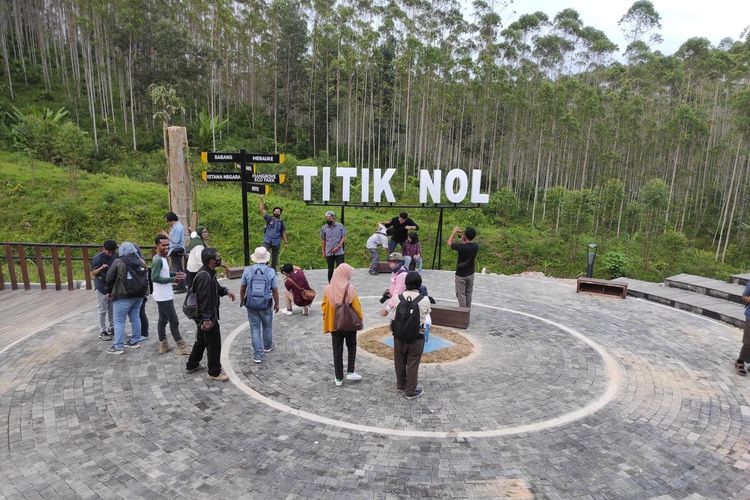
STRATEGIC ASSESSMENT. Despite widespread and growing scepticism, President Joko “Jokowi” Widodo recently insisted that plans to establish a new capital city named Nusantara in East Kalimantan will proceed.
While critics have pointed to issues like the huge cost involved and its potential impact on local communities, one issue has not received much attention – the hierarchical and closed governance arrangements planned for the new capital.
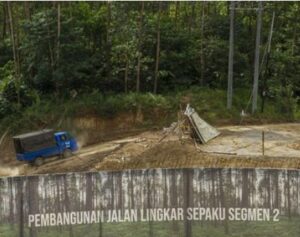
Law No. 3 of 2022 on the National Capital was passed earlier this year, after just 43 days of deliberation, with minimal public consultation. The Law establishes a Nusantara Capital City Authority (Badan Otorita IKN) responsible for preparation, development and relocation to the new city, as well as governance of the new capital region.
This new law locates the new capital in a grey area in Indonesia’s decentralisation policy. The Nusantara Capital City Authority is on the same institutional level as a ministry, and the president directly appoints the head of the authority (much like he does other ministers), and the new capital will not have its own legislature. This means residents will not be able to choose their own local government; they will only be able to vote in the presidential and national legislative elections.
Indonesia will offer generous incentives to companies investing in a 32 billion USD project to build a new capital city in the country called Nusantara, an official has said.

Bambang Susantono, head of the Nusantara National Capital Authority, revealed the information at an event to introduce the new capital project held in the current capital Jakarta. “We will give fiscal and non-fiscal incentives, including a 30-year tax break for investment in infrastructure and public services worth over 10 billion Rp (645,000 USD),” he said.
There will also be a 20-year tax exemption for investment in shopping malls, tourism spots and MIC facilities, he said, adding that the government plans to offer a 350% tax deduction for investment in research and development activities in Nusantara.
In his speech, Indonesian President Joko Widodo said the new capital will be built into a smart city based on forest and natural resources, with green zones accounting for 70% of its total area.
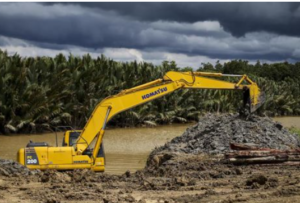
President Jokowi is working to reassure investors that his capital relocation plan is on track and construction progress will be more visible in January. Jokowi made a short trip on a naval ship to the site of Nusantara, the envisioned new capital on the island of Borneo, highlighting what is expected to become a major transportation route.
After inspecting work on infrastructure and a planned Presidential Palace, he said, “I think this is good progress,” according to a statement published by the presidential office. The statement also says that in January the private sector and investors will be active in the new capital’s development.
An official from the Investment Ministry told Nikkei Asia that investors from the United Arab Emirates, China, South Korea, Taiwan, Saudi Arabia, Japan, and several European countries are interested in investing in the new capital. So far, however, no major private investments have been publicly announced by foreign companies.
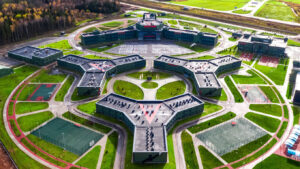
President Joko “Jokowi” Widodo inaugurated the Jagat Nusantara social media platform at the Djakarta Theater, Central Jakarta. The platform presents the new capital city or IKN Nusantara in the form of a metaverse.
According to the President, the IKN metaverse is an opportunity for people to share knowledge and meet great people all over the country, or even the world.
Through the IKN metaverse, Jokowi said that artists across the country could hold concerts and exhibit their creations virtually to the public. Moreover, people can also exercise in the digital world.
Indonesia is struggling to attract foreign investors to fund the development of a $32bn new capital city on the jungle-clad island of Borneo after Japan’s SoftBank withdrew its backing in March.
“Many countries are interested in participating” in the government’s plan to shift the capital from Jakarta to the newly christened city of Nusantara, including China, Japan and South Korea, the lead official for the project insisted.
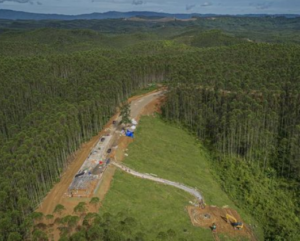
“Hopefully by the end of this year we [will] know how many investors are very serious,” said Bambang Susantono, head of the Nusantara Capital City Authority, in an interview with the Financial Times.
Investment Minister Bahlil Lahadalia said six countries have declared their commitment to invest in Indonesia’s ambitious new capital city Nusantara project: the United Arab Emirates, China, South Korea, Japan, Taiwan, and one European country.
Bahlil said he will visit Europe at the end of the month to attract investors. Similarly, Maritime Affairs and Investment Coordinating Minister Luhut Binsar Pandjaitan is also scheduled to visit the United States to attract new investors.
Indonesia is preparing an incentives package to attract investment in its future $32 billion capital city Nusantara, an official said on Tuesday, hoping to deliver on a key plank of President Joko Widodo’s economic agenda.
The megaproject entails moving the capital of Southeast Asia biggest economy from heavily congested Jakarta to an underdeveloped area on Borneo island. Early construction started a few months ago.
The government is finalising a regulation that would offer “several fiscal and non-fiscal incentives” for opening businesses in Nusantara, said Bambang Susantono, head of the Nusantara National Capital Authority, which heads the project.
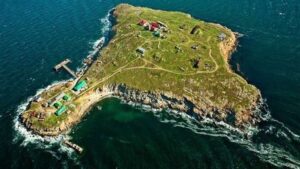
Indonesia is preparing an incentives package to attract investment in its future $32-billion capital city Nusantara, Nusantara Capital City Authority Chair Bambang Susantono said hoping to deliver on a key plank of President Jokowi’s economic agenda. The government is finalizing a regulation that would offer “several fiscal and non-fiscal incentives” for opening businesses in Nusantara, said Bambang. He added that the President would soon lead an investment promotion campaign and discuss business prospects with potential investors. Public Works and Public Housing Ministry Director Agus Sulaeman on Tuesday said that foreign investors are interested in collaborating with the government in building houses in the Nusantara capital city. One of which is a South Korean investor, Korean Land and Housing Corporation, which has expressed its desire to collaborate in the development of the planned capital city.
Indonesia will offer generous incentives, including a 30-year tax break, for companies investing in a $32 billion project to build a new capital city in the country called Nusantara, Nusantara National Capital Authority Chair Bambang Susantono said at a gathering with hundreds of local and foreign investors in Jakarta.
As many as 100,000 construction workers will accelerate work next year in an effort to get the site ready by Aug. 17, 2024, when President Jokowi wanted to celebrate Indonesia’s Independence Day at a new presidential palace, Bambang said. Bambang added investors in certain research and development fields will be given a super tax deduction of up to 350 percent.

President Jokowi assured people not to be worried about the sustainability of the capital city development because it already has a clear legal basis. President Jokowi encouraged investors to place capital in the newly established city, while pointing out that investors don’t need to be concerned about investing in the development per se as the framework has already been established.
House Speaker Puan Maharani appreciated Russia’s interest to be involved in the railway transportation project in the Nusantara new capital city through Russian Railways.
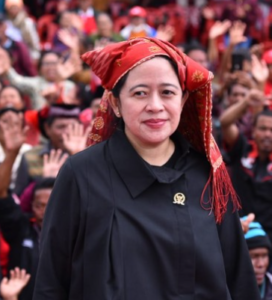
She said Indonesia is currently still waiting for the continuation of President Putin’s offer to develop rail transportation at the new capital. She said the House also hopes that the plan to enhance the partnership between Indonesia and Russia as strategic partners can be realized soon, as well as the launch of Indonesia’s trade negotiations with the Eurasian Economic Forum.
The private sector has no choice but to work together over the coming decades if we are to build a better world for future generations. Particularly in a time of global geopolitical division, and increased levels of intergovernmental antagonism, global business must unlock the potential of globalisation, and be a force for co-operation and collaboration. The Nusantara project, featured in your article, is an appropriate example of this.
Our capital, Jakarta, is the fastest sinking city in the world. There is no question that we need a new capital. Nusantara can be the world’s flagship modern city, and serve as a model for the smart, green cities of the future. These types of initiatives are not vanity projects — they are integral to our planet’s future. The world’s urban population is set to more than double with nearly seven out of 10 people living in cities by 2050, according to the World Bank.
The Indonesian G20 Presidency has urged superpower countries to contribute to efforts to support sustainable infrastructure development, especially in the post-COVID-19 pandemic period.
The development of sustainable infrastructure is important for handling climate change, which superpower countries have also contributed to, Finance Minister Sri Mulyani Indrawati noted during the “T20 Special Event: Sustainable Infrastructure Investment and Financing” in Washington D.C., the US.

Dr Sharyn Davies is Director of the Herb Feith Indonesia Engagement Centre at Monash University. Chindy Christine is a Master of Translation Studies student at The University of Western Australia.If you were designing a city from the ground up, what would you prioritise? Affordable, quality housing with easy access to work, childcare, healthcare, education, and entertainment would surely be front runners. A critical emphasis on environmental sustainability and clean energy would no doubt underpin these. Indonesia has a rare opportunity to implement these elements in its new purpose-built capital, Nusantara. But there is one more thing that must be a priority for planners: ensuring the city is safe and supportive for all residents. Relocating a capital city is not undertaken lightly, but Indonesia has no other option. Its current capital, Jakarta, is quite literally sinking. The megacity is home to more than 11 million residents but frequently swells to 30 million. Overpopulation is not the only issue, though. Jakarta is built on a delta system of 13 rivers. A staggering 40 percent of the capital now sits below sea level. There are many reasons for this, including the fact that the city is sinking as its aquifers are being depleted. Further, the city is heavily built up, which means that water cannot soak into the ground. Thus, flooding is a regular problem that will increase with climate change, the growing population, and aging infrastructure. Moving the capital will certainly ease some of Jakarta’s population pressures that are causing toxic levels of air pollution and chronic traffic congestion, but it will not address the underlying factors causing Jakarta’s water problems.
Sitting under the equator, Indonesia reaps a number of benefits, including with regard to space activities, particularly because the Geostationary Orbit (GSO) path is located right above the equator.
The GSO is the trajectory along which telecommunications and weather satellites operate. Another unique aspect of the GSO, located 35,871 kilometers above the sea level, is that satellites placed along this orbit seem to be stationary because one rotation of Earth is precisely equal to the period of the GSO orbit.
Equatorial countries that plan to launch space vehicles to the GSO must be aware of the geographical advantages. Launching space vehicles from an equatorial country will reduce the time needed to reach the GSO, effectively cutting the spending on fuel and the total costs Therefore, the construction of spaceports in equatorial countries may be strategic.
Indonesia could offer value-added tax exemptions, longer land permits and swifter licensing for those who invest in the new capital project, Investment Minister Bahlil Lahadalia told Nikkei Asia. He added that he is confident about bringing in outside investment and hinted at agreements with European investors “towards the end of the year.”
In an exclusive interview, Minister Bahlil emphasized the land permits in Nusantara, the name of the proposed new capital, would be for “a longer period compared to the other zones in Indonesia. The extended land permits can reach 100 years for the new capital city. “There will also be swifter licensing periods for investors coming to the new capital as well as competitive land prices.”
At least 6,000 village heads throughout Indonesia were scheduled to visit the new capital city, IKN Nusantara, in Sepaku, Penajam Paser Utara, East Kalimantan. The visit of the village heads will be carried out in a series of activities at the National Coordination Meeting of the Indonesian Association of Village Administrations (Apdesi) in December 2022.
“I am informed that approximately 6,000 village heads will attend IKN. This shows that the community truly supports IKN,” said East Kalimantan Governor Isran Noor when receiving a visit from the Apdesi’s central board executives (DPP) in Samarinda.
The Indonesian government will offer companies tax relief for 30 years and a 350% “super-tax deduction” for spending on research and development if they invest in the proposed new capital city, “Nusantara”, in East Kalimantan province on Borneo island.
Mr. Bambang Susantono, head of the government’s Nusantara National Capital Authority, promised the incentives at a flashy gathering of hundreds of local and foreign investors on 18 October in the ballroom of the Djakarta Theater, Jakarta, Reuters reports.
The plan for the new city, to be built on virgin land amid rainforests, relies on private investment for around 80% of its projected $32bn cost.
It is the flagship project of Indonesian President Joko Widodo, who wants the government moved to the 6.6-hectare government zone with new buildings including for ministries, the State Palace, the House of Representatives, and housing for some 50,000 civil servants and 500,000 residents in place for 17 August 2024, Indonesia’s Independence Day.
The plan to relocate the seat of Indonesia’s government was announced by President Joko Widodo in 2019 and this year the Indonesian parliament passed a law enabling the proposed relocation. The decision to move the capital to Nusantara was taken as Jakarta is saturated – both in a population sense, and more so by regular floods. The name “Nusantara”, which in Bahasa Indonesia means archipelago, reflects the country’s growing strategic and economic power projection ambitions.
Strategically, shifting its capital to East Kalimantan will position Indonesia’s locus closer to areas of most interest, namely the Celebes Sea, Arafura Sea, and the Pacific Ocean. It is no secret that Indonesia aims to position itself as a dynamic Indo-Pacific power exploiting its formidable centrally located position.
Indonesia’s vision for a “Global Maritime Fulcrum” and its part in shaping the ASEAN Outlook on the Indo-Pacific are testament to its desire to play that role. Taken together with developments Indonesia is undertaking on and around Natuna Island, its objective to be a maritime player is clear to see.








